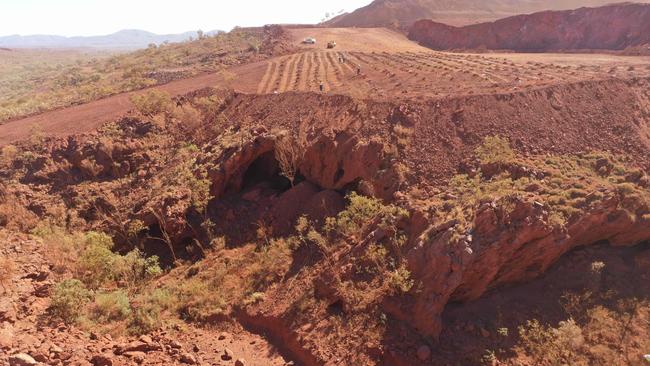Rio Tinto Juukan Gorge blast shame stirs cultural overhaul
Rio Tinto’s destruction of Juukan Gorge in May 2020 has triggered a bipartisan push for a federal takeover of Aboriginal cultural heritage matters.

Rio Tinto’s destruction of Juukan Gorge in May 2020 has triggered a bipartisan push for a federal takeover of Aboriginal cultural heritage matters, with a landmark report saying the states failed in their handling of important sites.
The federal parliamentary inquiry into the incident that sparked a global outcry and led to the sacking of Rio Tinto CEO JS Jacques issued its final report on Monday, outlining a sweeping overhaul of cultural heritage laws.
Under the proposed changes, Indigenous groups would have the power to sue mining companies over destruction of heritage sites, while criminal penalties for damaging sites would be increased.
The changes would be reflected in a new national framework that sets out a minimum standard for cultural heritage protection for states and territories, and bolsters the commonwealth’s ability to override state and territory decisions on the destruction of sites.
Professor Marcia Langton, associate provost at the University of Melbourne and a co-chair of the panel designing an Indigenous voice to parliament, said the inquiry’s recommendations were critical to prevent the “wanton destruction” of Aboriginal cultural heritage, and urged commonwealth, state and territory ministers to implement the reforms.
“Transparency is the main key to stopping the cowboy behaviour of mining companies, but so too is a clear process of legal reform undertaken jointly by Australian governments with Indigenous leaders,” she said.
But another Aboriginal leader, Noel Pearson, said the inquiry had “squibbed it” by failing to both uncover the truth of what happened and hold people responsible for the “crime” committed against Australia’s cultural heritage. “The Australian people and parliament were waiting for the truth. This parliamentary committee dodged the truth and gave Rio Tinto a ‘get out of jail’ card,” he said.
“This report does not provide ‘the way forward’. The report does not tell the truth of how Rio Tinto have misled the public and indeed misled the parliamentary committee, and the commonwealth government regulators. The truth has not emerged from this inquiry.”
The most scathing comments towards Rio Tinto came from Liberal senator Dean Smith and LNP MP George Christensen, who used their additional comments to the inquiry’s final report to chastise the mining giant. The pair said there should be a judicial inquiry into the episode to see whether further actions – including criminal charges – could be warranted.
But in a sign the proposed additional federal powers have caused division within the Coalition, Senator Smith and Mr Christensen rejected the committee’s recommendation to establish new “duplicate and unnecessary laws and regulations at a federal level”. “There is a great danger these proposed laws and regulations will be used as deliberate weapons against the resources sector … and ultimately undermine job opportunities and other economic benefits for Indigenous people,” they said.
The comments sit at odds with the rest of the inquiry panel, which was chaired by LNP MP Warren Entsch and included Nationals senator Matthew Canavan and LNP MP Phillip Thompson.
The states, the report said, had time and again prioritised development over protection and would “continue to fail” without an overarching legislative framework to guide the protection if Indigenous cultural heritage.
Mr Entsch said the destruction of the Juukan Gorge sites caused “immeasurable cultural and spiritual loss, as well as profound grief for the Puutu Kunti Kurrama and Pinikura (PKKP) peoples”, the traditional owners of the sites.
The call for more federal oversight also drew some concern from the mining sector, with the Chamber of Minerals and Energy of Western Australia saying it was the overhaul of WA’s Aboriginal cultural heritage legislation that should be the “absolute priority”.
Under the inquiry’s recommendations, parliament would amend existing federal legislation to make the Minister for Indigenous Australians responsible for all Aboriginal and Torres Strait Islander cultural heritage matters.
Existing agreements between mining companies and Indigenous groups would also be overhauled, with the inquiry recommending the ban of “gag clauses” that prohibit Indigenous groups from speaking out against mining companies operating on their land, and a ban on clauses preventing traditional owners from seeking protection through commonwealth legislation.
A spokesman for the PKKP Aboriginal Corporation said in a statement on Monday traditional owners would take some time to consider the report. “For the PKKP, actions not words will be the true test,” said the statement.
Rio Tinto chief executive Jakob Stausholm welcomed the inquiry’s findings.
Additional reporting: Paige Taylor, Nick Evans








To join the conversation, please log in. Don't have an account? Register
Join the conversation, you are commenting as Logout